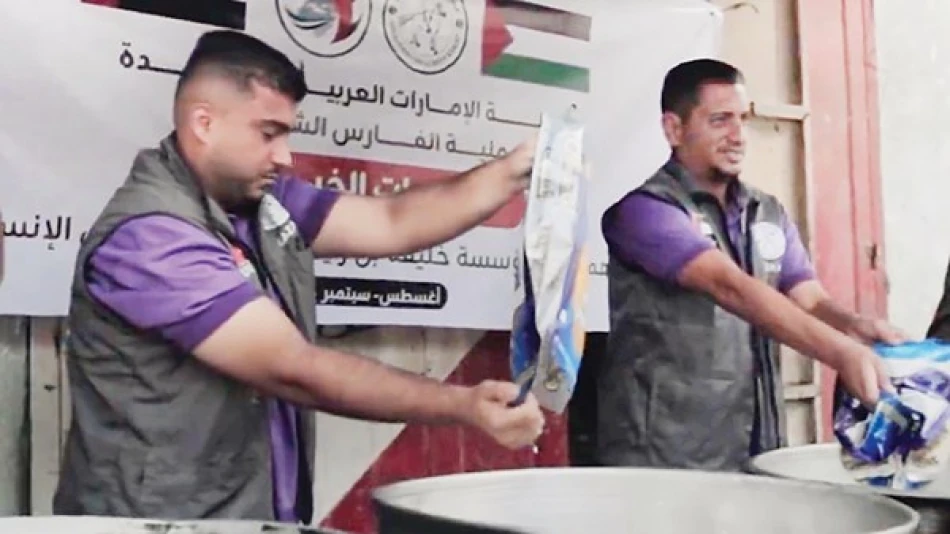
UAE Extends Humanitarian Aid to Charitable Kitchens in Gaza, Aiding Communities in Need
UAE Expands Gaza Relief Operations as Humanitarian Crisis Deepens
The United Arab Emirates has significantly scaled up its humanitarian assistance to Gaza through "Operation Gallant Knight 3," now feeding over 40,000 people daily through charitable kitchens across the territory. The expansion comes as the Gulf nation positions itself as a key regional humanitarian actor amid ongoing international diplomatic efforts to address the crisis.
Strategic Humanitarian Infrastructure
The UAE's approach centers on supporting existing local infrastructure rather than creating parallel systems. The operation now backs 20 charitable kitchens—13 in southern Gaza and seven in the central governorate—providing essential food supplies and operational resources to maintain daily meal services.
This model reflects lessons learned from previous humanitarian crises in Yemen and Syria, where sustainable local partnerships proved more effective than temporary international interventions. By strengthening existing community kitchens, the UAE ensures continuity even if external supply chains face disruption.
Beyond Emergency Food Relief
Medical Diplomacy in Action
The Emirates has deployed a comprehensive medical strategy that extends far beyond traditional aid. The country operates a fully-equipped field hospital inside Gaza while simultaneously evacuating critical patients to UAE medical facilities—a dual approach that addresses both immediate and complex medical needs.
This medical evacuation program mirrors similar initiatives the UAE has conducted in Afghanistan and Lebanon, establishing the country as a regional medical hub for crisis situations. The strategy serves both humanitarian and soft-power objectives, building long-term relationships with affected populations.
Digital Distribution Networks
The operation has resumed food parcel distribution through an electronic portal system, representing a significant technological advancement in humanitarian aid delivery. This digital approach allows for better tracking, reduced duplication, and more efficient resource allocation—critical factors when operating in complex emergency environments.
Regional Implications and Diplomatic Positioning
The UAE's sustained Gaza operations reflect broader regional dynamics following the Abraham Accords. By maintaining substantial humanitarian engagement with Palestinians while preserving normalized relations with Israel, the Emirates demonstrates a nuanced diplomatic approach that other Gulf states are closely watching.
This positioning contrasts sharply with traditional regional powers like Saudi Arabia and Egypt, who face different domestic and international constraints in their Gaza engagement. The UAE's smaller size and diverse economy provide greater flexibility in navigating these complex relationships.
Operational Scale and Impact
Feeding 40,000 people daily represents a massive logistical undertaking in Gaza's constrained environment. The operation requires coordinated supply chains, local partnerships, and continuous security assessments—capabilities the UAE has developed through its humanitarian interventions across the Middle East and Africa.
The focus on displacement camps and registered shelters indicates sophisticated targeting mechanisms that prioritize the most vulnerable populations. This approach maximizes impact while building detailed databases of affected populations that could prove valuable for longer-term reconstruction efforts.
The UAE's Gaza operations signal a long-term commitment that extends beyond immediate crisis response, potentially reshaping regional humanitarian architecture and diplomatic relationships in the post-conflict period.
Most Viewed News

 Layla Al Mansoori
Layla Al Mansoori






